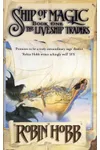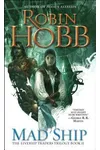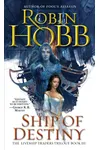Step aboard the enchanting world of the Liveship Trilogy, where sentient ships carved from magical wizardwood sail the seas, carrying secrets as deep as the ocean! Penned by fantasy maestro Robin Hobb, this nautical epic fantasy series follows the spirited Althea Vestrit as she fights to reclaim her family’s living ship, weaving a tale of pirates, traders, and ancient magic that’ll hook any fantasy fan.
Set in the vibrant Realm of the Elderlings, the Liveship Trilogy blends swashbuckling adventure with profound themes of identity, family, and consciousness. With its richly drawn characters and a world where ships have souls, this series is a treasure chest of storytelling that’s both thrilling and thought-provoking.
How the Liveship Trilogy Sailed into Being
Robin Hobb, a pen name for Margaret Astrid Lindholm Ogden, crafted the Liveship Trilogy as the second chapter in her sprawling Realm of the Elderlings saga. After the success of her Farseer Trilogy, Hobb turned her gaze to the seas, inspired by her childhood in a fishing community and a love for nautical tales. Published between 1998 and 2000, the trilogy emerged from her desire to explore a fresh corner of her world, focusing on the trading city of Bingtown and its unique liveships—vessels that awaken after three generations of family deaths aboard their decks.
Hobb’s knack for grounding fantasy in human emotion shines here, with influences from classic adventure authors like Robert Louis Stevenson. Her immersive world-building and multi-perspective narrative set the stage for a series that critics, including Orson Scott Card, have hailed as a benchmark for modern fantasy.
The Heart of the Liveship Trilogy
The trilogy unfolds across three hefty tomes: Ship of Magic (1998), The Mad Ship (1999), and Ship of Destiny (2000). In Ship of Magic, Althea Vestrit’s dreams of captaining her family’s liveship, Vivacia, are dashed when her brother-in-law seizes control, plunging the family into the morally murky slave trade. The Mad Ship escalates the stakes as Althea teams with the mysterious liveship Paragon, while pirate captain Kennit’s ambitions threaten Bingtown. Ship of Destiny ties the saga together, revealing ancient secrets and delivering a finale that’s both epic and emotionally resonant.
The series dives deep into themes of gender, morality, and trauma, set against a water-centric world where sea serpents call the ocean “the Plenty.” Althea defies patriarchal norms, while characters like the enigmatic Amber challenge gender boundaries. Hobb’s prose, lauded by George R. R. Martin, balances psychological depth with high-seas adventure, making every character—from the cunning Kennit to the sentient Vivacia—feel alive. The trilogy’s nautical setting, with its blend of piracy and mysticism, feels like a love letter to classic adventure tales, yet wholly original.
Unlike traditional epic fantasy, the Liveship Trilogy isn’t about chosen ones or dark lords. It’s a character-driven saga where personal and societal conflicts collide, exploring how individuals navigate duty, freedom, and change in a world of sentient ships and ancient prophecies.
Why the Liveship Trilogy Resonates
The Liveship Trilogy has left an indelible mark on fantasy, often cited as Hobb’s finest work. Its nuanced portrayal of women and complex villains like Kennit has earned praise from outlets like Booklist, which called it a prospective classic. Fans on platforms like Reddit rave about its emotional depth and slow-burn storytelling, cementing its cult status among fantasy readers. The series’ exploration of consciousness through liveships has also sparked academic discussions, with scholars noting its subversive take on gender and trauma.
Decades later, the trilogy remains a beacon for readers seeking fantasy that’s as introspective as it is adventurous. Its influence echoes in modern nautical fantasies and character-driven epics, proving Hobb’s storytelling is timeless.
About the Liveship Trilogy
- Publication Years: 1998–2000
- Number of Books: 3 (Ship of Magic, The Mad Ship, Ship of Destiny)
- Setting: Bingtown and the Cursed Shores in the Realm of the Elderlings
- Page Count: Approximately 2,689 pages across the trilogy
Ready to set sail? Grab Ship of Magic and dive into the Liveship Trilogy’s mesmerizing world of adventure, magic, and heart!


